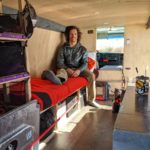
We all know, that rest is important and sending The Route is much more likely after a good night’s sleep. In my experience, sleep quality can drop while traveling and especially if you are sleeping in a van or a motorhome. But it doesn’t necessarily have to be so, and I’m happy to share some tips and tricks for all of you fellow sleepy dirtbags out there…
I’m not a true hippie sleeping in the back of a Volkswagen Transporter, but I have been living in a motorhome for over six months now. Anyway, I guess the principles of how to sleep well in your ‘home on wheels’ are the same in both cases.
When you are on the road for a longer period of time, you typically move from one place to another every once in a while. Sometimes you just don’t find a perfect spot near the crag and might have to try out several places before hitting the jackpot; an even(ish), quiet oasis with easy access and 4G. Those are my criteria for a good camping site for the night, and most of them (all but the internet access) have quite a lot to do with getting the needed rest after a long day of climbing.
With a big car, it all starts with one question:
Where do I fit?
Even if you can squeeze the car by the road, you might not want to sleep there. Parking just by the road usually leaves you with no or very little choice on how you park the car. As you know, it’s also pretty nerve-racking to try to sleep when the passing cars whoosh just a few inches from you.
This is where Google Maps comes in handy. Turn on the satellite map and you can probably spot some potential camping sites nearby. Look for dead ends somewhere in the bushes, as those tend to give you some privacy. If you are in a more urban environment, football fields or other sporting venues might work as well (golf clubs seem very alluring on the map, but usually have gates). In such places, you can probably spend the night without anybody disturbing your sweet dreams about that 7a crux move.
After you’ve managed to find a good spot, it’s time to park the car. Such a simple task, right? Nope.
It’s not comfortable to sleep or make breakfast in the morning if it feels as if you were in a funhouse. If you are planning to live in a car for more than a few weeks, I suggest that you invest in a pair of wheel chocks and a leveler
. Try to install a small leveler somewhere you can see it when you’re sitting behind the wheel. Both tools will save quite a bit of your time and don’t cost a fortune. I’d rather spend my evening browsing through the topo than driving the car back and forth.
When you are ready to go to bed, there are two accessories that might come in handy. Depending on when and where you’re traveling, nights can get quite chilly even after a warm and sunny day at the crag. To avoid getting cold during the night, I recommend bringing along a sleeping bag. In my experience, a sleeping bag with the comfort temperature somewhere around 0°C is a safe choice. I spent the last December in Portugal and January in southern Spain, and the temperature in the car was often just a few degrees in the morning. All of you outdoorsy people probably own a sleeping bag anyway, so why wouldn’t you take it with you?
Another thing that might keep you up at night is your partner’s snoring. After a tiring day, there’s a chance that the person next to you will start snoring like a lumberjack as soon as you go to bed. Earplugs to the rescue!
I suggest that you keep a pair of earplugs somewhere you can reach them easily in the middle of the night. Even if you are traveling alone, you’ll probably need earplugs at some point of the journey. I don’t own earplugs and just recently had one sleepless night, because the cows in the nearby field were mooing all night long. And when the cows were silent, the bells on their necks still jingled like crazy. So trust me and invest a few coins in a pair of comfortable earplugs.
Last but not least: air out the bedding regularly.
Washing the sheets every week might not be possible on the road, but airing out is an easy way to freshen up the bedding. Think about all the chalk and sweat that’s in your hair after climbing for several hours … Where do you think that ends up? Getting rid of all the moisture and dust in the bedding is most likely to earn you a better sleep quality.
Anyway, with these tips, I hope that you wake up feeling fresh and ready to send your project. Don’t underestimate the power of sleep in recovery.
If you liked this article, we think you’ll also enjoy:
- 6 Tips for Dirtbagging with Your Dog
- Dirtbag Gifts: Awesome Stuff Under 20 Bucks
- Dirtbag Tricks: Finding Love and Free Showers
- Essay: #Vanlife or the Quarter Life Crisis
Lastly, don’t forget to check out our most popular articles ever published, free rock climbing eBooks, and the internet’s best climbing gear sales.







